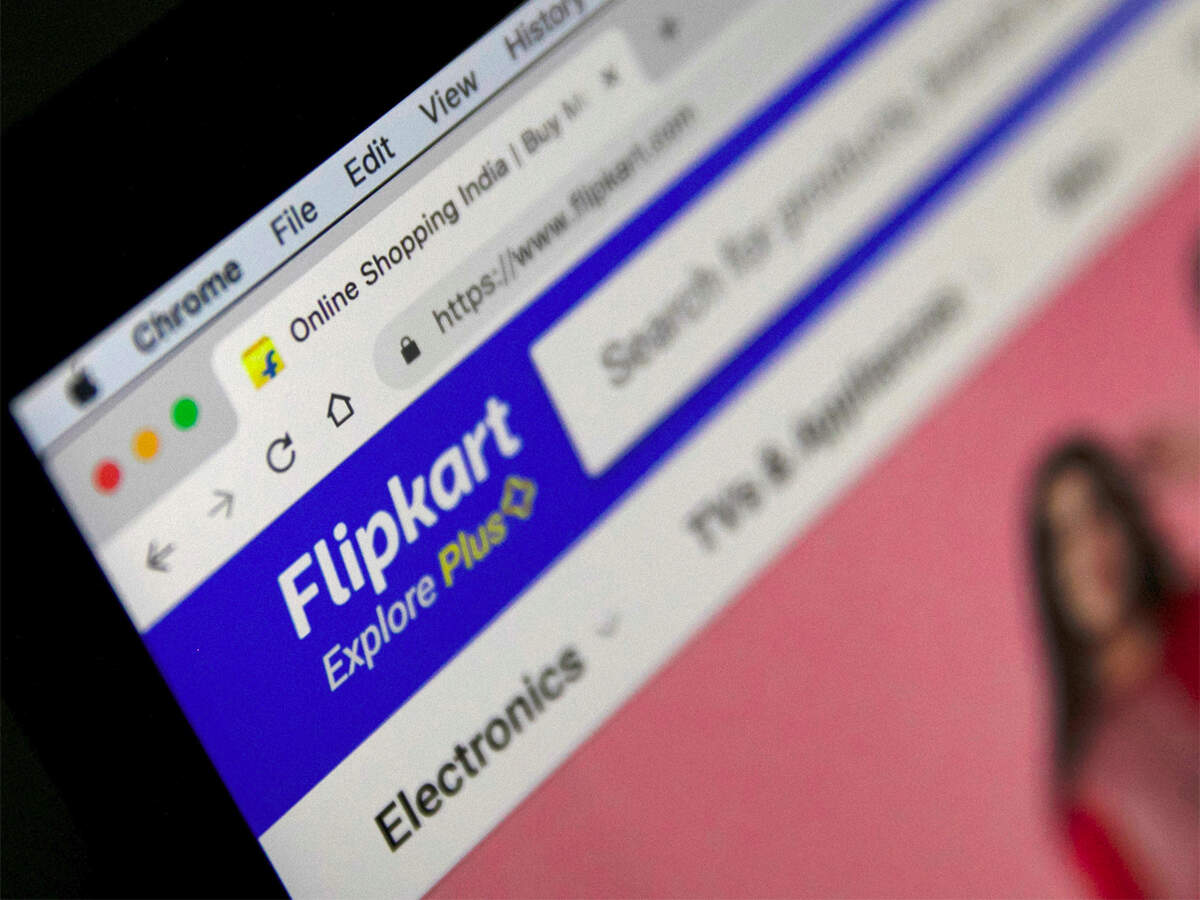 NEW DELHI: Flipkart is creating a layer of B2B (business-to-business) entities that will act as intermediaries between its wholesale arm and prominent sellers on its platform to comply with foreign investment rules for ecommerce marketplaces, people familiar with the development said.Flipkart, which Walmart. acquired for $16 billion in May, has appointed eight-nine such independent entities, code-named alpha sellers, which will buy goods from Flipkart India, the wholesale arm of the Flipkart Group, according to the people.The alpha sellers will supply merchandise to beta sellers, which will offer them on the Flipkart marketplace. The introduction of the intermediary alpha sellers will help Flipkart meet a cap of 25% on vendors purchasing goods from entities related to marketplace operators, the people said.
NEW DELHI: Flipkart is creating a layer of B2B (business-to-business) entities that will act as intermediaries between its wholesale arm and prominent sellers on its platform to comply with foreign investment rules for ecommerce marketplaces, people familiar with the development said.Flipkart, which Walmart. acquired for $16 billion in May, has appointed eight-nine such independent entities, code-named alpha sellers, which will buy goods from Flipkart India, the wholesale arm of the Flipkart Group, according to the people.The alpha sellers will supply merchandise to beta sellers, which will offer them on the Flipkart marketplace. The introduction of the intermediary alpha sellers will help Flipkart meet a cap of 25% on vendors purchasing goods from entities related to marketplace operators, the people said.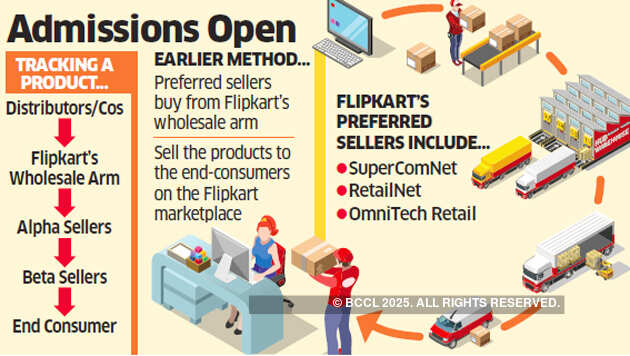 “Inventory of a vendor will be deemed to be controlled by ecommerce marketplace entity if more than 25% of purchases of such a vendor are from the marketplace entity or its group companies,” the government said in a note on December 26, prescribing norms that came into effect on February 1.Previously, some “preferred sellers” of Flipkart including Super-ComNet, OmniTech Retail and RetailNet used to purchase products directly from Flipkart’s wholesale unit and sell them to consumers on the online marketplace.These preferred sellers will now source most of their supplies from the B2B alpha distributors. Flipkart is enrolling more alpha intermediaries as well as consumer-facing beta sellers as part of its business restructuring, they said.“Flipkart wholesale will invoice to alpha and then alpha sells it to beta,” said a person familiar with the plans. Flipkart said it is in compliance with the latest FDI rules. “At Flipkart marketplace, we are delighted to be serving as a platform for connecting lakhs of sellers and customers and committed to ensure sellers on our marketplace continue to access the consumers across the country efficiently and in a cost-effective way,” a Flipkart spokesperson said.The top executive of a company that was approached to act as an intermediary said he was offered a “fixed” income for becoming an alpha seller. Another person familiar with the plans said Flipkart was offering “assured returns” or small percentages of commissions to intermediaries.The December FDI announcements mandated both Flipkart and Amazon to overhaul their business models to stay compliant with norms that bar such marketplace operators from owing sellers on their platforms.ET had reported on February 7 that Flipkart is in talks with retailers and distributors of Samsung, Xiaomi and FMCG products to enrol them on its platform to push sales while conforming to regulations for foreign-owned online marketplaces.
“Inventory of a vendor will be deemed to be controlled by ecommerce marketplace entity if more than 25% of purchases of such a vendor are from the marketplace entity or its group companies,” the government said in a note on December 26, prescribing norms that came into effect on February 1.Previously, some “preferred sellers” of Flipkart including Super-ComNet, OmniTech Retail and RetailNet used to purchase products directly from Flipkart’s wholesale unit and sell them to consumers on the online marketplace.These preferred sellers will now source most of their supplies from the B2B alpha distributors. Flipkart is enrolling more alpha intermediaries as well as consumer-facing beta sellers as part of its business restructuring, they said.“Flipkart wholesale will invoice to alpha and then alpha sells it to beta,” said a person familiar with the plans. Flipkart said it is in compliance with the latest FDI rules. “At Flipkart marketplace, we are delighted to be serving as a platform for connecting lakhs of sellers and customers and committed to ensure sellers on our marketplace continue to access the consumers across the country efficiently and in a cost-effective way,” a Flipkart spokesperson said.The top executive of a company that was approached to act as an intermediary said he was offered a “fixed” income for becoming an alpha seller. Another person familiar with the plans said Flipkart was offering “assured returns” or small percentages of commissions to intermediaries.The December FDI announcements mandated both Flipkart and Amazon to overhaul their business models to stay compliant with norms that bar such marketplace operators from owing sellers on their platforms.ET had reported on February 7 that Flipkart is in talks with retailers and distributors of Samsung, Xiaomi and FMCG products to enrol them on its platform to push sales while conforming to regulations for foreign-owned online marketplaces.
 NEW DELHI: A group of small sellers on Amazon and Flipkart has written to the Department for Promotion of Industry and Internal Trade (DPIIT) seeking stricter norms so that ecommerce companies can’t arbitrarily change the terms of business and suspend accounts.They have also asked for rules to bring greater transparency on online platforms such as an exhaustive disclosure of advantages they may give
These regulations are similar to the European Union’s recently announced digital single market rules to halt unfair practices. The All India Online Vendors Association, which represents more than 3,500 online sellers, said the DPIIT must urgently implement these rules “to ease our business.”“Platforms have a free hand to conduct their business. This is leaving a lot of issues unresolved and lot of businesses being affected due to unreasonable blacklisting, data glitches, and absence of appealing and frequent changes in policies. We need ease of business while conducting business on platforms,” the group said.The department is said to be drafting a policy for the ecommerce sector. It said in December that online marketplaces and their group companies can’t own vendors and prohibits them from controlling the inventory sold on their platforms. Small and medium sellers have complained about marketplaces giving preferential treatment to certain large sellers previously as well, leading to unfair competition.
NEW DELHI: A group of small sellers on Amazon and Flipkart has written to the Department for Promotion of Industry and Internal Trade (DPIIT) seeking stricter norms so that ecommerce companies can’t arbitrarily change the terms of business and suspend accounts.They have also asked for rules to bring greater transparency on online platforms such as an exhaustive disclosure of advantages they may give
These regulations are similar to the European Union’s recently announced digital single market rules to halt unfair practices. The All India Online Vendors Association, which represents more than 3,500 online sellers, said the DPIIT must urgently implement these rules “to ease our business.”“Platforms have a free hand to conduct their business. This is leaving a lot of issues unresolved and lot of businesses being affected due to unreasonable blacklisting, data glitches, and absence of appealing and frequent changes in policies. We need ease of business while conducting business on platforms,” the group said.The department is said to be drafting a policy for the ecommerce sector. It said in December that online marketplaces and their group companies can’t own vendors and prohibits them from controlling the inventory sold on their platforms. Small and medium sellers have complained about marketplaces giving preferential treatment to certain large sellers previously as well, leading to unfair competition.
 NEW DELHI: Flipkart co-founder Sachin Bansal has invested about Rs 650 crore in Ola, giving the Indian ride-hailing company more ammunition to compete with rival Uber.The investment is in Sachin's personal capacity and is also the largest financing by an individual in Ola till date, Ola said in a statement. In January, Ola had issued shares worth Rs 150 crore to Sachin as part of series J round of funding.Sachin, who founded Flipkart over a decade ago with Binny Bansal, had quit after US retail behemoth Walmart picked up 77 per cent stake in the Indian e-commerce company for $16 billion."Ola is one of India's most promising consumer businesses, that is creating deep impact and lasting value for the ecosystem," Bansal said.The investment is part of Ola's plans to raise about $1 billion in funding. In October last year, the Bengaluru-based company had announced raising $1.1 billion funding from China's Tencent Holdings and SoftBank Group.It had also stated that it was in "advanced talks" to close an additional $1 billion funding to take total mop-up to more than $2 billion.Ola is locked in a battle for market leadership with US-based rival Uber in India and other markets like Australia, New Zealand and the UK. The Indian company has been aggressively ramping up its rides business as well as hailing platform and food delivery operations (through Foodpanda)."We are extremely thrilled to have Sachin Bansal onboard Ola as an investor. He is an icon of entrepreneurship and his experience of building one of India's most respected businesses ground up, is unparalleled," said Bhavish Aggarwal, co-founder and CEO at Ola.
NEW DELHI: Flipkart co-founder Sachin Bansal has invested about Rs 650 crore in Ola, giving the Indian ride-hailing company more ammunition to compete with rival Uber.The investment is in Sachin's personal capacity and is also the largest financing by an individual in Ola till date, Ola said in a statement. In January, Ola had issued shares worth Rs 150 crore to Sachin as part of series J round of funding.Sachin, who founded Flipkart over a decade ago with Binny Bansal, had quit after US retail behemoth Walmart picked up 77 per cent stake in the Indian e-commerce company for $16 billion."Ola is one of India's most promising consumer businesses, that is creating deep impact and lasting value for the ecosystem," Bansal said.The investment is part of Ola's plans to raise about $1 billion in funding. In October last year, the Bengaluru-based company had announced raising $1.1 billion funding from China's Tencent Holdings and SoftBank Group.It had also stated that it was in "advanced talks" to close an additional $1 billion funding to take total mop-up to more than $2 billion.Ola is locked in a battle for market leadership with US-based rival Uber in India and other markets like Australia, New Zealand and the UK. The Indian company has been aggressively ramping up its rides business as well as hailing platform and food delivery operations (through Foodpanda)."We are extremely thrilled to have Sachin Bansal onboard Ola as an investor. He is an icon of entrepreneurship and his experience of building one of India's most respected businesses ground up, is unparalleled," said Bhavish Aggarwal, co-founder and CEO at Ola.
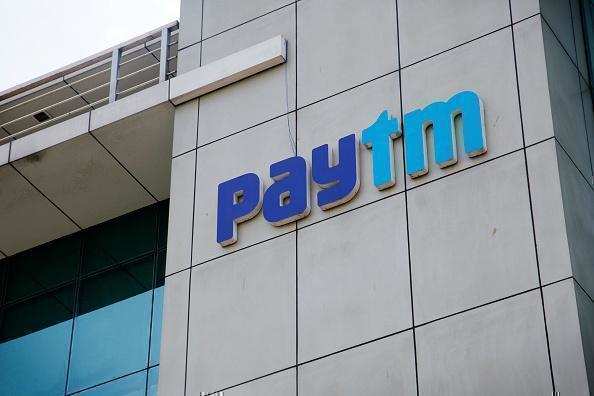 One97 Communications, which owns digital payments major Paytm, has pledged all it current assets and mutual fund investments to ICICI Bank in order to be able to borrow up to Rs 1,400 crore for working capital, according to documents filed with the Registrar of Companies.Working capital is needed for every corporate entity to function, but industry executives said an enhancement in the limit could indicate the company might need money to aggressively fund its expansion plans or use it for new businesses. Paytm could be using the funds to push its plans on Paytm Postpaid, which it runs in partnership with ICICI Bank, they added.ET's email query to One97 Communications remained unanswered till the time of going to press.
Through Paytm Postpaid, eligible customers can buy services at one go and pay later. The company had started the service with ICICI Bank customers only. Industry executives have pointed out that this could be the next big disruption in the payments space.Paytm, founded by Vijay Shekhar Sharma, has grown from being a payments entity to handling mutual funds, e-commerce, and hotel bookings, among other businesses.It was reported recently that the company would be moving from a consumer facing space to a business-to-business entity for Paytm Mall.
One97 Communications, which owns digital payments major Paytm, has pledged all it current assets and mutual fund investments to ICICI Bank in order to be able to borrow up to Rs 1,400 crore for working capital, according to documents filed with the Registrar of Companies.Working capital is needed for every corporate entity to function, but industry executives said an enhancement in the limit could indicate the company might need money to aggressively fund its expansion plans or use it for new businesses. Paytm could be using the funds to push its plans on Paytm Postpaid, which it runs in partnership with ICICI Bank, they added.ET's email query to One97 Communications remained unanswered till the time of going to press.
Through Paytm Postpaid, eligible customers can buy services at one go and pay later. The company had started the service with ICICI Bank customers only. Industry executives have pointed out that this could be the next big disruption in the payments space.Paytm, founded by Vijay Shekhar Sharma, has grown from being a payments entity to handling mutual funds, e-commerce, and hotel bookings, among other businesses.It was reported recently that the company would be moving from a consumer facing space to a business-to-business entity for Paytm Mall.
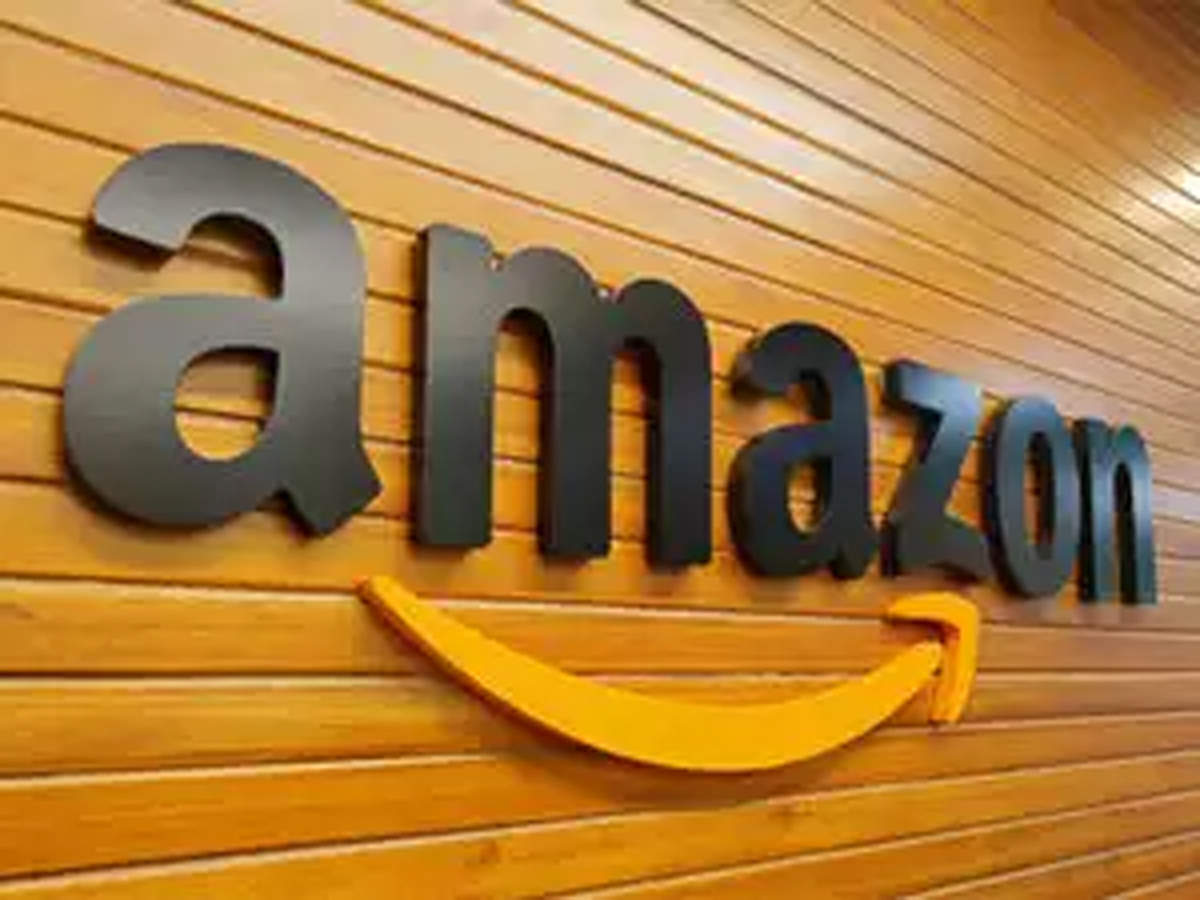 Amazon, which had quietly launched its own range of home-cleaning products under Presto! in India last year, has been significantly undercutting the prices of best-selling brands in the category such as Harpic, Lizol and Pril, to name a few. The drive to grow its private-label business in the FMCG category comes even as some brands and smaller sellers have raised concerns over the marketplace not maintaining a level playing field by favouring its own private labels and captive sellers.While no official announcement of the launch of Presto! was made by Amazon India, the products—which range from floor disinfectants, paper napkins to dishwashing gel— seem to have started going on sale sometime in October last year, while reviews from Indian buyers for many products only date back to January 2019. Presto! has existed as a private label from Amazon in the US and some other overseas markets. Amazon India did not respond to an ET query on the launch and strategy behind Presto!Products from Presto! go up against household brands such as Harpic and Lizol which are owned by British multinational consumer goods firm Reckitt Benckiser, Pril which is sold in India by Jyothy Laboratories after it acquired a controlling stake in German firm Henkel a few years ago. A 975 ml pack of Lizol’s disinfectant surface cleaner sells for Rs 149 on Amazon, the equivalent product from Presto! is priced at Rs 109. Similarly, 750 ml of Presto! dish wash gel sells for Rs 77, while a 425 ml pack of Pril sells for Rs 98.
Amazon has recruited a slew of local contract manufacturers to produce Presto! products which are being marketed and sold by Cloudtail, the joint venture between Amazon and Infosys founder NR Narayana Murthy’s family office Catamaran Ventures. The US firm recently reduced its stake in Cloudtail to 24% from 49% to comply with local laws.“With the current regulatory framework, we could see Amazon (brands owned by the ecommerce company) emerging as an FMCG brand on its own. Perhaps it won’t be as widely distributed at a retail channel level as a typical FMCG company, but that’s the lens one has to put on them,” said Devangshu Dutta, chief executive at retail consulting firm Third Eyesight, in relation to regulations that don’t allow marketplaces to control their own inventory. He adds that unlike smartphones and fashion which have driven the bulk of Amazon India’s sales so far, by getting into the FMCG space, Amazon is looking at building frequency among its buyers. “In this market, price is the low hanging fruit, so once they build trust and frequency, they can build the price back up.”
Amazon, which had quietly launched its own range of home-cleaning products under Presto! in India last year, has been significantly undercutting the prices of best-selling brands in the category such as Harpic, Lizol and Pril, to name a few. The drive to grow its private-label business in the FMCG category comes even as some brands and smaller sellers have raised concerns over the marketplace not maintaining a level playing field by favouring its own private labels and captive sellers.While no official announcement of the launch of Presto! was made by Amazon India, the products—which range from floor disinfectants, paper napkins to dishwashing gel— seem to have started going on sale sometime in October last year, while reviews from Indian buyers for many products only date back to January 2019. Presto! has existed as a private label from Amazon in the US and some other overseas markets. Amazon India did not respond to an ET query on the launch and strategy behind Presto!Products from Presto! go up against household brands such as Harpic and Lizol which are owned by British multinational consumer goods firm Reckitt Benckiser, Pril which is sold in India by Jyothy Laboratories after it acquired a controlling stake in German firm Henkel a few years ago. A 975 ml pack of Lizol’s disinfectant surface cleaner sells for Rs 149 on Amazon, the equivalent product from Presto! is priced at Rs 109. Similarly, 750 ml of Presto! dish wash gel sells for Rs 77, while a 425 ml pack of Pril sells for Rs 98.
Amazon has recruited a slew of local contract manufacturers to produce Presto! products which are being marketed and sold by Cloudtail, the joint venture between Amazon and Infosys founder NR Narayana Murthy’s family office Catamaran Ventures. The US firm recently reduced its stake in Cloudtail to 24% from 49% to comply with local laws.“With the current regulatory framework, we could see Amazon (brands owned by the ecommerce company) emerging as an FMCG brand on its own. Perhaps it won’t be as widely distributed at a retail channel level as a typical FMCG company, but that’s the lens one has to put on them,” said Devangshu Dutta, chief executive at retail consulting firm Third Eyesight, in relation to regulations that don’t allow marketplaces to control their own inventory. He adds that unlike smartphones and fashion which have driven the bulk of Amazon India’s sales so far, by getting into the FMCG space, Amazon is looking at building frequency among its buyers. “In this market, price is the low hanging fruit, so once they build trust and frequency, they can build the price back up.”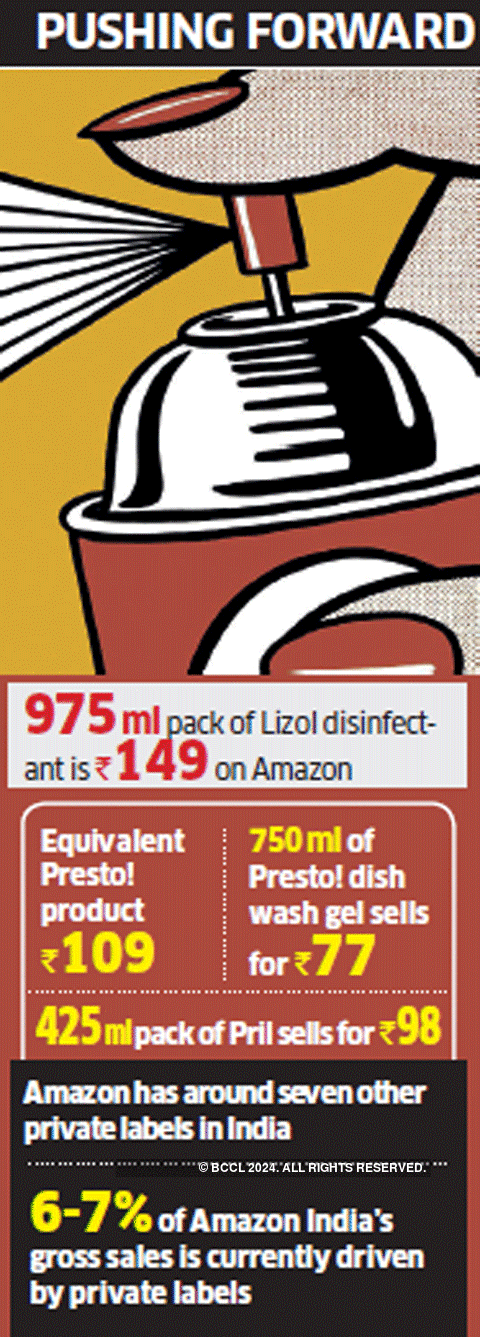 Apart from Presto!, Amazon has around seven other private labels in India. In the fashion category it has Symbol, Myx, House & Shields and Arthur Harvey; in small furniture and appliances it sells products through Solimo; there’s AmazonBasics for small electronics, and electronic accessories; and in groceries it has Vedaka. According to market analyst RedSeer Consulting, 6-7% of Amazon India’s gross sales is currently driven by private labels.While both Amazon and rival Walmart-owned Flipkart have argued that they launch private labels to plug gaps in their product portfolios, third-party sellers and some brands say that they capitalise on their knowledge of best-selling products and introduce their own clones to drive more business and earn higher margins. Experts also say that private labels pressure big brands to cut prices to stay competitive on their platforms.
Apart from Presto!, Amazon has around seven other private labels in India. In the fashion category it has Symbol, Myx, House & Shields and Arthur Harvey; in small furniture and appliances it sells products through Solimo; there’s AmazonBasics for small electronics, and electronic accessories; and in groceries it has Vedaka. According to market analyst RedSeer Consulting, 6-7% of Amazon India’s gross sales is currently driven by private labels.While both Amazon and rival Walmart-owned Flipkart have argued that they launch private labels to plug gaps in their product portfolios, third-party sellers and some brands say that they capitalise on their knowledge of best-selling products and introduce their own clones to drive more business and earn higher margins. Experts also say that private labels pressure big brands to cut prices to stay competitive on their platforms.
 BENGALURU: With Cloudtail and Appario Retail making a comeback on Amazon, third-party vendors have expressed concern over how they would compete with these preferred sellers. ET spoke to several third-party sellers, who said they are once again competing on price, shipping and logistics and do not expect a level playing field even now. The ownership of Cloudtail and Appario has been restructured so that they are no longer Amazon group companies and can sell products on the ecommerce marketplace, in compliance with FDI rules effective February 1, ET reported on Thursday. “It got our hopes up for all but five days. The changes in rules might have forced Amazon and Flipkart to do some restructuring, but at the end of the day there’s still no level playing field. The government has failed miserably,” said a mid-size online seller, asking not to be identified.The smaller sellers had first demanded that the government check the predatory pricing and deep discounting practices on online marketplaces because it was hurting their businesses. When the government clarified the FDI rules for ecommerce marketplaces in December, clamping down on sellers in which marketplaces had equity and prohibiting them from controlling inventory, the small sellers thought it would fix the problem.
“It’s a given that Amazon and Flipkart will want to control 50-60% of their revenue, leaving 40% to a long tail of sellers who can bring differentiated products to the market, which is what I do. I have no problem selling to Cloudtail or Flipkart’s Alpha sellers, but I’d hoped for a level playing field where all sellers were treated equally,” said another seller.For many of these sellers, it wasn’t about Flipkart and Amazon having a stake in sellers, but about these sellers getting better deals on shipping and advertising, reducing their overheads and allowing them to sell products at lower costs. The latest FDI guidelines, while addressing the matter of control over inventory and influencing prices, also say that ecommerce platforms should provide services such as fulfilment, logistics, warehousing and advertising to all their vendors in a fair and nondiscriminatory manner.“If there is a level playing field on the platform where all sellers are treated equally and charged the same fees and policy effects, all sellers are welcome. In case of Cloudtail its growth has been fuelled by the huge difference in the fees that Amazon charges from it compared to normal sellers. We just want a level playing field,” said a member of the All India Online Vendors Association.
BENGALURU: With Cloudtail and Appario Retail making a comeback on Amazon, third-party vendors have expressed concern over how they would compete with these preferred sellers. ET spoke to several third-party sellers, who said they are once again competing on price, shipping and logistics and do not expect a level playing field even now. The ownership of Cloudtail and Appario has been restructured so that they are no longer Amazon group companies and can sell products on the ecommerce marketplace, in compliance with FDI rules effective February 1, ET reported on Thursday. “It got our hopes up for all but five days. The changes in rules might have forced Amazon and Flipkart to do some restructuring, but at the end of the day there’s still no level playing field. The government has failed miserably,” said a mid-size online seller, asking not to be identified.The smaller sellers had first demanded that the government check the predatory pricing and deep discounting practices on online marketplaces because it was hurting their businesses. When the government clarified the FDI rules for ecommerce marketplaces in December, clamping down on sellers in which marketplaces had equity and prohibiting them from controlling inventory, the small sellers thought it would fix the problem.
“It’s a given that Amazon and Flipkart will want to control 50-60% of their revenue, leaving 40% to a long tail of sellers who can bring differentiated products to the market, which is what I do. I have no problem selling to Cloudtail or Flipkart’s Alpha sellers, but I’d hoped for a level playing field where all sellers were treated equally,” said another seller.For many of these sellers, it wasn’t about Flipkart and Amazon having a stake in sellers, but about these sellers getting better deals on shipping and advertising, reducing their overheads and allowing them to sell products at lower costs. The latest FDI guidelines, while addressing the matter of control over inventory and influencing prices, also say that ecommerce platforms should provide services such as fulfilment, logistics, warehousing and advertising to all their vendors in a fair and nondiscriminatory manner.“If there is a level playing field on the platform where all sellers are treated equally and charged the same fees and policy effects, all sellers are welcome. In case of Cloudtail its growth has been fuelled by the huge difference in the fees that Amazon charges from it compared to normal sellers. We just want a level playing field,” said a member of the All India Online Vendors Association.
 NEW DELHI: Flipkart is creating a layer of B2B (business-to-business) entities that will act as intermediaries between its wholesale arm and prominent sellers on its platform to comply with foreign investment rules for ecommerce marketplaces, people familiar with the development said.
NEW DELHI: Flipkart is creating a layer of B2B (business-to-business) entities that will act as intermediaries between its wholesale arm and prominent sellers on its platform to comply with foreign investment rules for ecommerce marketplaces, people familiar with the development said.





